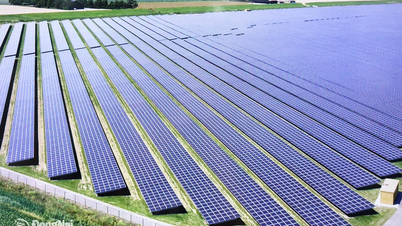
The renewable energy sector is huge and requires a long time, so currently green bonds are pouring into real estate projects more than renewable energy.
After going through the "winter" period of 2022 - 2023, the corporate bond market is experiencing remarkable growth in terms of issuance value. In 2024, the total issuance value reached about 443,000 billion VND, an increase of nearly 27% compared to the previous year. In the first half of this year, the issuance value continued to increase sharply.
However, of the total issuance of 156,000 billion VND of corporate bonds since the beginning of the year: 113,000 billion VND from issuing banks; 28,000 billion VND from real estate companies; 9,000 billion VND from the securities sector; 5,000 billion VND from Vinfast .
The lack of capital mobilization activities in the corporate bond market continues to unbalance the current capital market picture in Vietnam. Because capital for medium and long term should come from the securities channel instead of short-term input mobilization channels such as banks.
The scale of capital mobilization through the Vietnamese corporate bond market is currently only equivalent to about 11% of GDP, while outstanding credit is currently about 138% of GDP. Meanwhile, the scale of the bond market in many countries in the region such as China is 100%, South Korea 80%, Malaysia 55%, Thailand 25%.
Specializing in investing in renewable energy projects, wind power and solar power, projects that require long-term capital, 15-20 years. However, the company said that because of the long investment period, if it issues bonds, it will be difficult to attract investors to participate.
Mr. Dang Quoc Bao - Deputy General Director of Trung Nam Group said: "The energy sector is very large and legally complex, requiring a long time. While energy project developers need to develop in a short time, they cannot extend it, so green bonds are pouring into real estate projects rather than renewable energy."
From the perspective of enterprises, if they issue bonds, they will have to pay interest rates of 10-12%/year to bondholders. This interest rate is even higher than the interest rates for medium and long-term loans of some banks, which are currently only around 9-10%/year. Not to mention, enterprises must also meet other strict conditions for issuing bonds. Therefore, many enterprises choose to borrow capital, instead of proactively issuing bonds.
"Logistics businesses also need capital to expand their business development in the logistics sector, but it is very difficult for logistics businesses to issue bonds to attract stable long-term capital sources with reasonable interest rates," said Mr. Tran Tien Dung - Chairman of Macstar Group.
To increase the number of businesses issuing bonds, analysts say it is necessary to develop a more vibrant bond market, especially in the secondary market. Because if you want to attract bond investors, the bonds themselves must be attractive and easy to buy and sell on the market.
Mr. Nguyen Ba Hung - Chief Economist in Vietnam, Asian Development Bank (ADB) said: "When the secondary market is active, the demand of investors for good bond products increases, leading to good bonds being easier to issue, lower costs, and after issuance, they are also better received by the financial market. That in turn creates attraction for businesses to issue more bonds."
Experts also believe that it is necessary to expand credit rating companies and underwriting services. These measures will help improve the transparency and reputation of corporate bonds. From there, investors will be attracted to invest in the market.
Raising standards for corporate bond market
Thus, the banking sector is leading the bond issuance activity. The main reason is that loan growth is much higher than deposit growth, forcing banks to increase the issuance of long-term bonds to meet capital needs.
The real estate group is a group with a very large capital demand, but in fact, the bond issuance from the beginning of the year until now of this group has decreased, the amount of bonds bought back has increased. Accumulated from the beginning of the year until now, the total value of bonds bought back before maturity has reached 55,204 billion VND, of which real estate is the leading industry group, accounting for nearly 51% of the total value of early buyback.
In May 2025, the market recorded 4 more overdue bonds from 3 real estate companies. These are all businesses with a history of late bond payments and weak credit profiles, low profits and high financial leverage. The unresolved backlog makes the barrier to investor confidence in real estate corporate bonds still high.
"We also need to look at other figures such as the amount of bonds that are still being paid late or have been extended in the recent period. Even those that are being negotiated for repurchase, the majority come from real estate businesses. This shows that real estate businesses in this period also issue but on the other hand are also trying to reduce the amount of bonds currently in circulation," said Ms. Hoang Viet Phuong - General Director of SSI Ratings.
To improve the quality of the bond market, the National Assembly recently passed the revised Draft Law on Enterprises, which stipulates that the rate of private bond issuance must not exceed 5 times the owner's equity, which is expected to limit the issuance of substandard private bonds.
"This regulation only affects the issuance of individual bonds. The channel of issuing bonds to the public is not affected by these regulations. Therefore, businesses can completely access the corporate bond market through issuing bonds through the public, reaching a larger number of investors, especially individual investors," said Mr. Nguyen Dinh Duy - Director, Senior Analyst, Credit Rating and Research, VIS Ratings.
Mr. Bui Hoang Hai - Vice Chairman of the State Securities Commission said: "Capital mobilization through bond issuance is also a content that we have focused a lot on. Currently, the Securities Commission is also conducting research and proposing to the Ministry of Finance to build a new mechanism to create conditions for businesses operating in the field of infrastructure development to be able to issue bonds to the public."
While private bonds are a type of product that only institutional and professional investors can buy, public bonds are a type of bond that everyone can buy. However, according to VIS Ratings, the rate of public bond issuance in the Vietnamese market is still very small compared to private issuance, accounting for only about 17%.
In the remainder of 2025, the total value of bonds due will be VND151,870 billion, of which more than half are bonds about to mature in the real estate group.
In order for the bond market to develop commensurate with its potential and role as a capital mobilization channel for businesses and the economy, investors’ confidence in this market still needs to be restored. Because a market cannot develop if businesses only think of ways to find money to pay off debt to bondholders every day.
According to VTV.VN
Source: https://baohoabinh.com.vn/12/202120/Khoi-phuc-thi-truong-trai-phieu-doanh-nghiep.htm








































































































Comment (0)